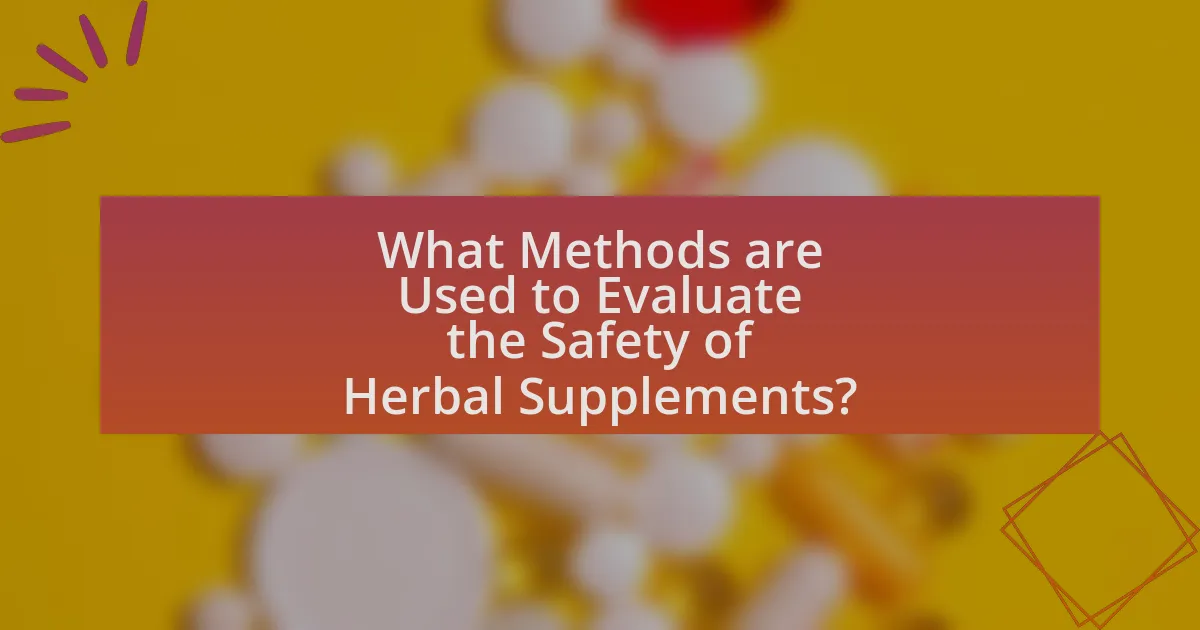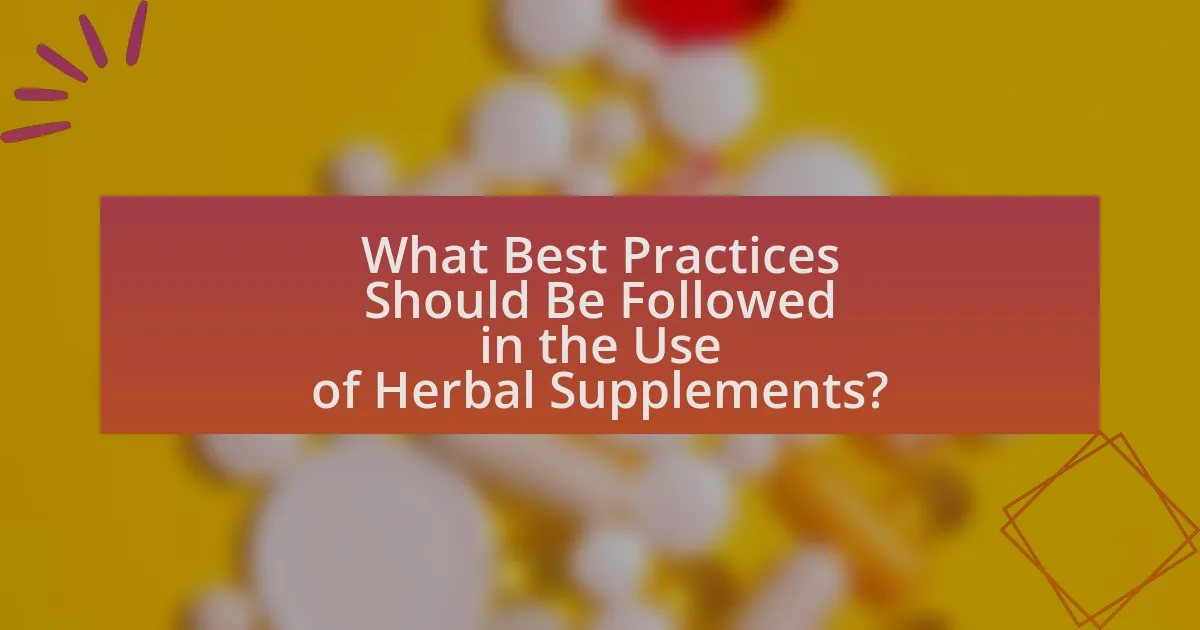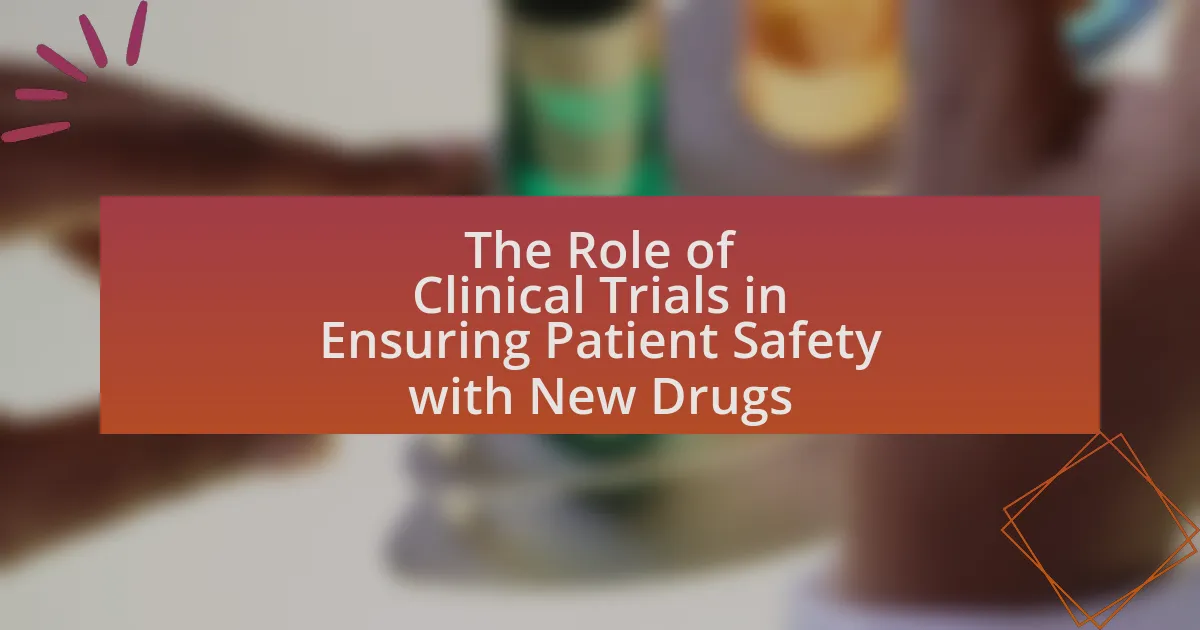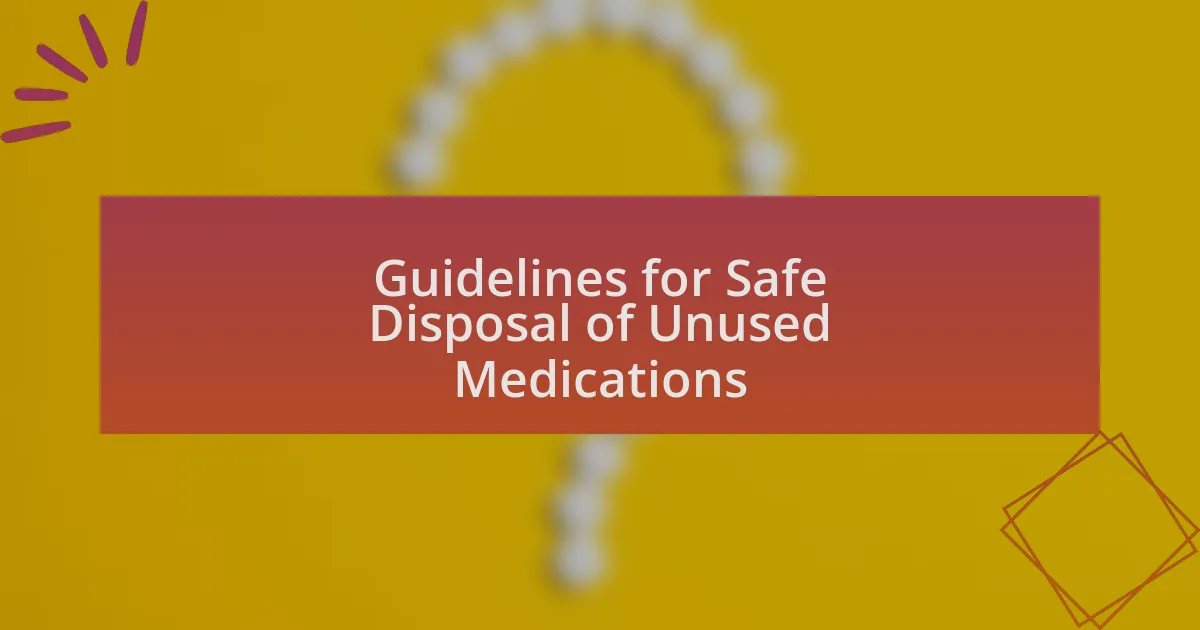Herbal supplements are plant-derived products used to enhance health and well-being, often integrated into pharmaceutical care as complementary treatments. This article evaluates the safety and efficacy of herbal supplements, highlighting their potential therapeutic benefits, common types, and the importance of assessing interactions with conventional medications. It discusses the regulatory frameworks governing herbal supplements, the challenges in evaluating their safety, and best practices for their use in patient care. Additionally, it emphasizes the role of healthcare professionals in ensuring informed decision-making and patient safety regarding herbal supplement use.
What are Herbal Supplements and Their Role in Pharmaceutical Care?

Herbal supplements are products derived from plants that are used to enhance health and well-being, often in the form of capsules, powders, teas, or extracts. In pharmaceutical care, herbal supplements play a role in complementary and alternative medicine, providing potential therapeutic benefits alongside conventional treatments. Evidence suggests that certain herbal supplements, such as St. John’s Wort for depression or ginger for nausea, can be effective; however, their safety and efficacy must be evaluated carefully due to possible interactions with prescription medications and variability in product quality. Regulatory bodies, like the FDA, do not rigorously evaluate herbal supplements before they reach the market, which underscores the importance of healthcare professionals assessing their use in patient care to ensure safety and effectiveness.
How are herbal supplements defined in the context of pharmaceutical care?
Herbal supplements are defined in the context of pharmaceutical care as products derived from plants that are used to enhance health or treat medical conditions. These supplements can include extracts, teas, capsules, and powders, and they are often utilized alongside conventional medications. The integration of herbal supplements into pharmaceutical care necessitates careful evaluation of their safety, efficacy, and potential interactions with prescribed medications, as evidenced by studies indicating that certain herbal products can affect drug metabolism and therapeutic outcomes.
What distinguishes herbal supplements from conventional medications?
Herbal supplements differ from conventional medications primarily in their composition and regulatory status. Herbal supplements are derived from plant sources and often contain multiple active compounds, whereas conventional medications are typically synthesized, standardized, and contain a single active ingredient designed for specific therapeutic effects.
Additionally, the regulatory framework for herbal supplements is less stringent than that for conventional medications; in many countries, herbal supplements are classified as dietary supplements and do not require pre-market approval or rigorous clinical testing for safety and efficacy, unlike conventional medications which undergo extensive clinical trials and must meet strict safety standards set by regulatory agencies such as the FDA. This distinction highlights the varying levels of oversight and scientific validation between the two categories.
What are the common types of herbal supplements used in pharmaceutical care?
Common types of herbal supplements used in pharmaceutical care include echinacea, ginseng, garlic, and St. John’s Wort. Echinacea is often utilized for its immune-boosting properties, while ginseng is known for enhancing energy and cognitive function. Garlic is frequently used for cardiovascular health, and St. John’s Wort is commonly prescribed for mild to moderate depression. These supplements are recognized for their therapeutic benefits, as evidenced by various studies that support their efficacy in specific health conditions. For instance, a review published in the Journal of Clinical Pharmacy and Therapeutics highlights the role of St. John’s Wort in managing depression, demonstrating its effectiveness compared to standard antidepressants.
Why is evaluating the safety of herbal supplements important?
Evaluating the safety of herbal supplements is important to prevent adverse health effects and ensure consumer protection. Herbal supplements can interact with prescription medications, leading to harmful side effects or reduced efficacy of treatments. For instance, St. John’s Wort is known to decrease the effectiveness of certain antidepressants and birth control pills. Furthermore, the lack of regulation in the herbal supplement industry can result in products that are contaminated or mislabeled, posing additional risks to consumers. Therefore, thorough safety evaluations are essential to safeguard public health and promote informed decision-making regarding herbal supplement use.
What risks are associated with the use of herbal supplements?
The risks associated with the use of herbal supplements include potential toxicity, interactions with prescription medications, and lack of regulation. Herbal supplements can contain harmful substances that may lead to adverse effects; for example, certain herbs like kava and comfrey have been linked to liver damage. Additionally, herbal supplements can interact negatively with pharmaceuticals, altering their effectiveness or increasing side effects; St. John’s Wort, for instance, can reduce the efficacy of antidepressants and birth control pills. Furthermore, the herbal supplement industry is not strictly regulated, leading to variability in product quality and concentration, which can pose additional health risks.
How can adverse effects impact patient care?
Adverse effects can significantly impact patient care by leading to complications that may require additional medical interventions. When patients experience adverse effects from treatments, including herbal supplements, their overall health can deteriorate, resulting in increased hospital visits and prolonged recovery times. For instance, a study published in the Journal of Clinical Pharmacology found that adverse drug reactions account for approximately 5-10% of hospital admissions, highlighting the critical need for careful monitoring and evaluation of all supplements and medications used in patient care. This underscores the importance of assessing the safety profiles of herbal supplements to mitigate risks and ensure optimal patient outcomes.
What regulatory frameworks govern herbal supplements?
The regulatory frameworks governing herbal supplements primarily include the Dietary Supplement Health and Education Act (DSHEA) of 1994 in the United States, which classifies herbal products as dietary supplements rather than drugs. This classification means that herbal supplements do not require pre-market approval from the Food and Drug Administration (FDA) but must adhere to Good Manufacturing Practices (GMP) to ensure quality. Additionally, the Federal Trade Commission (FTC) regulates advertising claims related to herbal supplements, ensuring that they are not misleading. In Europe, the European Food Safety Authority (EFSA) oversees the safety and efficacy of herbal products, requiring health claims to be substantiated by scientific evidence. These frameworks collectively aim to ensure consumer safety while allowing for the availability of herbal supplements in the market.
How do regulations differ between countries?
Regulations regarding herbal supplements differ significantly between countries, primarily in terms of classification, safety standards, and marketing practices. For instance, in the United States, herbal supplements are classified as dietary supplements under the Dietary Supplement Health and Education Act of 1994, which allows them to be marketed without pre-market approval, placing the onus of safety on manufacturers. In contrast, the European Union employs a more stringent regulatory framework, requiring pre-market authorization for herbal products under the Traditional Herbal Medicinal Products Directive, which mandates safety and efficacy assessments before products can be sold. This divergence in regulatory approaches highlights the varying levels of consumer protection and oversight in different jurisdictions, impacting the safety and quality of herbal supplements available in the market.
What role do health authorities play in ensuring safety?
Health authorities play a critical role in ensuring safety by establishing regulations and guidelines for the evaluation and monitoring of herbal supplements. These authorities assess the safety, efficacy, and quality of herbal products before they reach consumers, thereby minimizing risks associated with their use. For instance, the U.S. Food and Drug Administration (FDA) requires that dietary supplements, including herbal products, be manufactured according to Good Manufacturing Practices (GMP) to ensure their safety and quality. Additionally, health authorities conduct post-market surveillance to monitor adverse effects and enforce compliance with safety standards, which helps protect public health.
What Methods are Used to Evaluate the Safety of Herbal Supplements?

The methods used to evaluate the safety of herbal supplements include clinical trials, toxicological assessments, and systematic reviews of existing literature. Clinical trials involve testing the herbal supplement on human subjects to observe any adverse effects and determine safe dosage levels. Toxicological assessments analyze the potential harmful effects of the herbal ingredients through laboratory studies, including animal testing and in vitro experiments. Systematic reviews compile and analyze data from multiple studies to provide a comprehensive understanding of the safety profile of specific herbal supplements. These methods collectively ensure that the safety of herbal supplements is rigorously evaluated before they are recommended for use.
How is clinical evidence gathered for herbal supplements?
Clinical evidence for herbal supplements is gathered through systematic reviews, randomized controlled trials (RCTs), observational studies, and meta-analyses. Systematic reviews compile data from multiple studies to assess the efficacy and safety of herbal supplements, while RCTs provide high-quality evidence by randomly assigning participants to treatment or control groups. Observational studies track outcomes in real-world settings, offering insights into long-term effects and safety. Meta-analyses statistically combine results from various studies to provide a comprehensive overview of the evidence. For instance, a systematic review published in the Journal of Herbal Medicine in 2021 analyzed 50 RCTs on herbal supplements, demonstrating their potential benefits and risks, thus reinforcing the importance of rigorous clinical evidence in evaluating these products.
What types of studies are conducted to assess safety?
Types of studies conducted to assess safety include randomized controlled trials (RCTs), observational studies, and systematic reviews. RCTs are considered the gold standard for evaluating safety as they minimize bias and allow for direct comparison between treatment groups. Observational studies, such as cohort and case-control studies, provide insights into safety by analyzing real-world data and long-term effects. Systematic reviews synthesize findings from multiple studies to provide a comprehensive assessment of safety across different populations and contexts. These methodologies are essential for ensuring that herbal supplements are safe for use in pharmaceutical care.
How do systematic reviews contribute to safety evaluations?
Systematic reviews contribute to safety evaluations by synthesizing existing research to provide a comprehensive assessment of the safety profile of interventions, including herbal supplements. They aggregate data from multiple studies, allowing for a more robust analysis of adverse effects and potential risks associated with these supplements. For instance, a systematic review may analyze various clinical trials and observational studies to identify common side effects or interactions with other medications, thereby informing healthcare professionals about the safety considerations necessary for patient care. This evidence-based approach enhances the reliability of safety evaluations, guiding regulatory decisions and clinical practices.
What are the challenges in evaluating herbal supplement safety?
Evaluating herbal supplement safety faces several challenges, primarily due to the lack of standardized testing and regulation. Herbal supplements often vary in composition, potency, and quality, which complicates the assessment of their safety profiles. Additionally, the presence of contaminants, such as heavy metals or pesticides, can pose significant health risks, yet these are not consistently tested for across products. Furthermore, the interaction of herbal supplements with prescription medications can lead to adverse effects, but comprehensive studies on these interactions are limited. The variability in individual responses to herbal ingredients also adds complexity, as factors like genetics, health status, and concurrent use of other substances can influence safety outcomes.
How do variations in product quality affect safety assessments?
Variations in product quality significantly impact safety assessments by influencing the reliability of the data used to evaluate potential risks. Inconsistent quality can lead to discrepancies in active ingredient concentrations, which may result in unexpected side effects or reduced efficacy. For instance, a study published in the Journal of Herbal Medicine found that 30% of herbal supplements tested contained different levels of active compounds than labeled, raising concerns about their safety and effectiveness. This inconsistency necessitates more rigorous safety assessments to account for the variability, ultimately affecting regulatory decisions and consumer health outcomes.
What role does patient variability play in safety evaluations?
Patient variability significantly influences safety evaluations by affecting how individuals respond to treatments, including herbal supplements. This variability encompasses genetic differences, age, sex, health status, and concurrent medications, which can alter drug metabolism and efficacy. For instance, studies have shown that genetic polymorphisms in drug-metabolizing enzymes can lead to different safety profiles for the same herbal supplement among diverse populations. Therefore, understanding patient variability is crucial for accurately assessing the safety and potential adverse effects of herbal supplements in pharmaceutical care.
How can healthcare professionals assess the safety of herbal supplements?
Healthcare professionals can assess the safety of herbal supplements by reviewing scientific literature, evaluating clinical evidence, and considering potential interactions with prescription medications. They should analyze studies that report on the efficacy and safety profiles of specific herbal products, such as randomized controlled trials or systematic reviews. For instance, a study published in the Journal of Clinical Pharmacology highlighted the importance of understanding the pharmacokinetics and pharmacodynamics of herbal supplements to identify any adverse effects or interactions. Additionally, healthcare professionals should consult databases like the National Center for Complementary and Integrative Health, which provides evidence-based information on herbal supplements, including safety data and potential side effects. This comprehensive approach enables healthcare professionals to make informed decisions regarding the use of herbal supplements in patient care.
What tools and resources are available for practitioners?
Practitioners have access to various tools and resources for evaluating the safety of herbal supplements in pharmaceutical care. These include databases such as the National Center for Complementary and Integrative Health (NCCIH) and the Natural Medicines Comprehensive Database, which provide evidence-based information on herbal products. Additionally, practitioners can utilize clinical guidelines from organizations like the American Herbal Products Association (AHPA) that outline safety assessments and best practices. Furthermore, resources such as PubMed and Cochrane Library offer access to peer-reviewed studies and systematic reviews that support informed decision-making regarding herbal supplement safety.
How can practitioners stay updated on safety information?
Practitioners can stay updated on safety information by regularly consulting reputable sources such as peer-reviewed journals, government health agencies, and professional organizations. For instance, the National Center for Complementary and Integrative Health (NCCIH) provides evidence-based information on herbal supplements, while the Food and Drug Administration (FDA) offers updates on safety alerts and recalls. Additionally, subscribing to newsletters from these organizations and attending relevant conferences can enhance practitioners’ knowledge of the latest safety data and research findings.
What Best Practices Should Be Followed in the Use of Herbal Supplements?

Best practices in the use of herbal supplements include consulting healthcare professionals, ensuring quality and purity of products, and being aware of potential interactions with medications. Consulting healthcare professionals, such as doctors or pharmacists, is crucial because they can provide personalized advice based on individual health conditions and medications. Ensuring quality and purity involves selecting supplements that are tested for contaminants and verified by third-party organizations, as the FDA does not regulate herbal supplements as strictly as pharmaceuticals. Awareness of potential interactions is essential, as certain herbal supplements can affect the efficacy of prescription medications, leading to adverse effects. For example, St. John’s Wort is known to interact with antidepressants and birth control pills, which underscores the importance of informed use.
How can patients be educated about herbal supplement safety?
Patients can be educated about herbal supplement safety through comprehensive informational resources and direct communication with healthcare professionals. Providing access to evidence-based literature, such as studies published in peer-reviewed journals, helps patients understand potential risks and benefits associated with herbal supplements. For instance, the National Center for Complementary and Integrative Health offers guidelines and safety information on various herbal products, emphasizing the importance of consulting healthcare providers before starting any new supplement. Additionally, pharmacists can play a crucial role by discussing interactions with prescription medications and advising on proper dosages, thereby enhancing patient awareness and safety regarding herbal supplement use.
What key information should patients know before using herbal supplements?
Patients should know that herbal supplements can interact with prescription medications and may have side effects. Research indicates that certain herbal products, such as St. John’s Wort, can reduce the effectiveness of medications like antidepressants and birth control pills. Additionally, the quality and concentration of active ingredients in herbal supplements can vary significantly, leading to inconsistent effects. The National Center for Complementary and Integrative Health reports that some herbal supplements may also pose risks for individuals with specific health conditions, such as liver disease or diabetes. Therefore, patients should consult healthcare professionals before starting any herbal supplement to ensure safety and efficacy.
How can healthcare providers facilitate informed decision-making?
Healthcare providers can facilitate informed decision-making by offering comprehensive information about treatment options, including the benefits and risks associated with herbal supplements. This approach ensures that patients understand the potential interactions between herbal products and prescribed medications, which is crucial for safe pharmaceutical care. Research indicates that effective communication and education from healthcare providers significantly enhance patient understanding and engagement in their treatment choices, leading to better health outcomes. For instance, a study published in the Journal of Herbal Medicine found that patients who received detailed counseling about herbal supplements were more likely to make informed decisions regarding their use alongside conventional medications.
What strategies can be implemented to minimize risks associated with herbal supplements?
To minimize risks associated with herbal supplements, consumers should prioritize sourcing products from reputable manufacturers that adhere to Good Manufacturing Practices (GMP). This ensures quality control and reduces contamination risks. Additionally, consulting healthcare professionals before starting any herbal supplement is crucial, as they can provide guidance based on individual health conditions and potential interactions with prescribed medications. Research indicates that approximately 70% of herbal supplements may not contain the ingredients listed on their labels, highlighting the importance of third-party testing for authenticity and potency. Furthermore, maintaining awareness of any adverse effects reported in clinical studies can inform safer usage practices.
How can proper dosing and administration enhance safety?
Proper dosing and administration enhance safety by ensuring that patients receive the correct amount of a substance, minimizing the risk of adverse effects. Accurate dosing prevents toxicity and under-dosing, which can lead to ineffective treatment. For example, a study published in the Journal of Ethnopharmacology found that incorrect dosing of herbal supplements can result in serious health complications, highlighting the importance of adhering to recommended dosages. Additionally, proper administration techniques, such as timing and method of delivery, further reduce the likelihood of interactions and side effects, thereby promoting overall patient safety.
What role does monitoring play in ensuring patient safety?
Monitoring plays a critical role in ensuring patient safety by enabling the early detection of adverse effects and interactions related to herbal supplements. Continuous observation of patient responses to these supplements allows healthcare providers to identify potential risks and adjust treatment plans accordingly. For instance, studies have shown that monitoring can reduce the incidence of adverse drug reactions by up to 50%, highlighting its importance in safeguarding patient health.
What are the common misconceptions about herbal supplements?
Common misconceptions about herbal supplements include the belief that they are always safe and effective, that they do not interact with prescription medications, and that they are regulated by the FDA in the same way as pharmaceuticals. Many people assume that because herbal supplements are natural, they pose no risks; however, studies have shown that some herbal products can cause adverse effects or interact negatively with conventional drugs. For instance, St. John’s Wort can reduce the effectiveness of certain antidepressants and birth control pills. Additionally, the FDA does not evaluate herbal supplements for safety or efficacy before they are marketed, leading to variability in product quality and potency.
How can addressing these misconceptions improve patient outcomes?
Addressing misconceptions about herbal supplements can significantly improve patient outcomes by enhancing informed decision-making and adherence to treatment plans. When patients understand the potential risks and benefits of herbal supplements, they are more likely to communicate openly with healthcare providers, leading to better management of their overall health. Research indicates that clear communication about the safety and efficacy of herbal products can reduce adverse drug interactions and improve therapeutic effectiveness, as evidenced by a study published in the Journal of Clinical Pharmacy and Therapeutics, which found that patients who received accurate information about herbal supplements reported fewer complications and better health outcomes.
What resources are available for accurate information on herbal supplements?
Accurate information on herbal supplements can be found through several reputable resources. The National Center for Complementary and Integrative Health (NCCIH) provides evidence-based information on various herbal products, including their uses, effectiveness, and safety. Additionally, the American Herbal Products Association (AHPA) offers guidelines and educational resources regarding herbal supplements. The Natural Medicines Comprehensive Database is another valuable resource that evaluates the safety and efficacy of herbal products based on scientific evidence. These organizations and databases are recognized for their commitment to providing reliable and research-backed information on herbal supplements.





